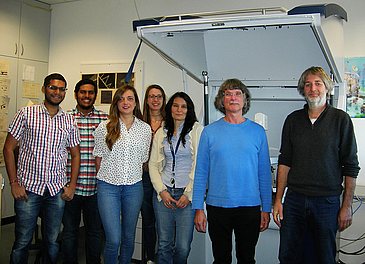The multinational “Phys2BioMed” Innovative Training Network will investigate the extent to which measurements of cell mechanics on individual cells, but also on tissue samples, can be used in clinical diagnostics. The idea is based on results from recent years, which have shown that the mechanical properties of cells change in various diseases, such as cancer cells. Within the framework of the network, technologies will be developed in cooperation with hospitals and companies that will enable the long-term use of cell mechanics as a diagnostic tool in hospitals.
Touching with the Force Microscope
In Bremen, Professor Manfred Radmacher’s research group participates in the Institute for Biophysics in the Faculty of Physics/Electrical Engineering. The research group examines the mechanical properties of cells and tissues with the force microscope. A fine tip mounted on a soft spring scans the sample – like with the human finger, cell surfaces can be scanned and properties such as roughness, stickiness, and softness measured. This happens in high resolution, so that even individual molecules can be examined. Since the force microscope can also be operated in liquids, it is possible to examine living biological samples. “Measuring small forces with high accuracy and spatial precision under physiological conditions is a unique combination that is not possible with any other microscopy technique,” says Professor Manfred Radmacher. Many diseased cells show striking mechanical properties: some are harder, others softer than healthy cells. For example, cancer cells are often softer than normal cells. “This is why we are trying to find out to what extent cell mechanics could also be used in medical diagnostics,” says Radmacher.
Intensive Exchange
The multinational project Phys2BioMed starts in January 2019 and will run for four years, under the coordination of the University of Milan. The Bremen research group is funded in the European network with 500,000 euros for two doctoral positions. Intensive exchange between the partners is important. The international consortium brings together researchers from Italy (Milan), France (Grenoble and Lille), Spain (Barcelona), Poland (Krakow), and Germany (Bremen and Münster). Commercial partners such as hospitals and companies are also involved. All participating researchers in the network meet regularly for workshops, two of which will take place in Bremen. Six doctoral students from the other partners will spend several-month research stays at the Institute for Biophysics at the University of Bremen.
Link to the coordinator’s press release in English: http://cimaina.unimi.it/research/grants/research_grants/4
Contact:
Professor Manfred Radmacher
Institute for Biophysics
Faculty of Physics/Electrical Engineering
University of Bremen
Tel.: +49 421 218-62280
E-mail: radmacher@uni-bremen.de

